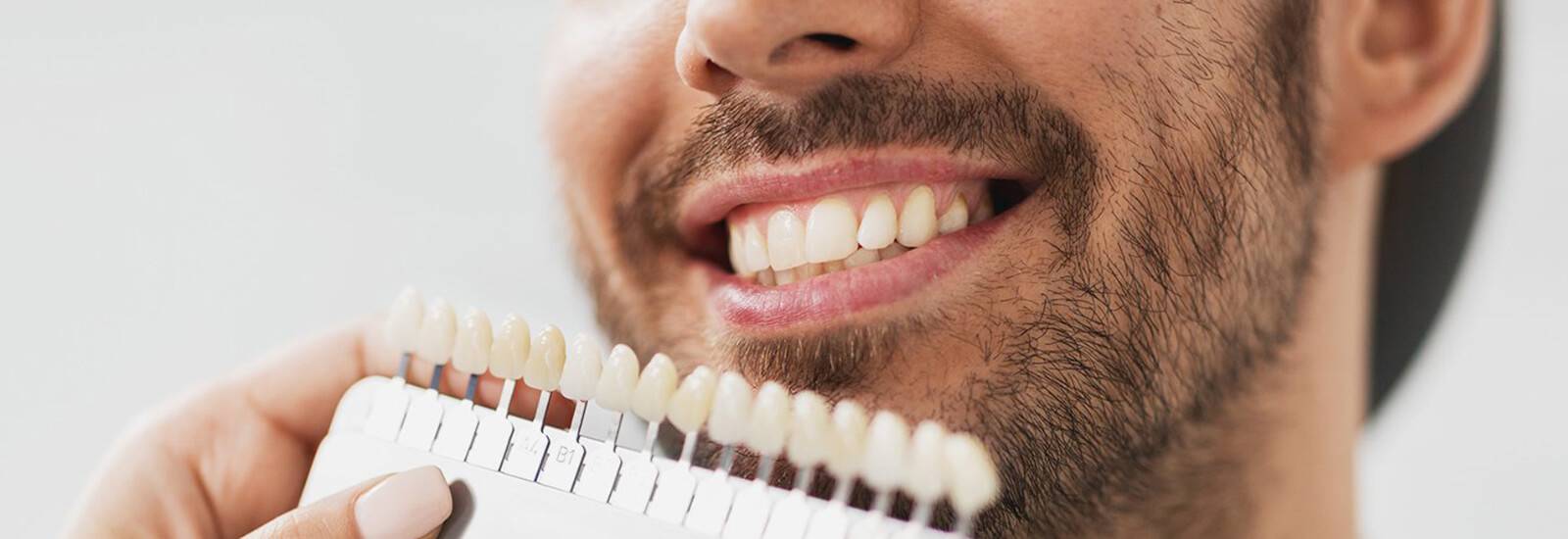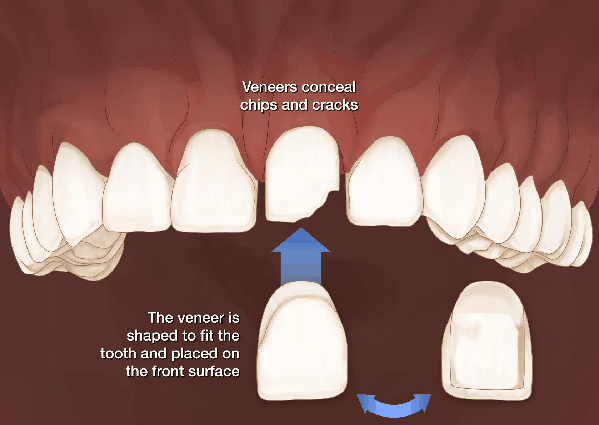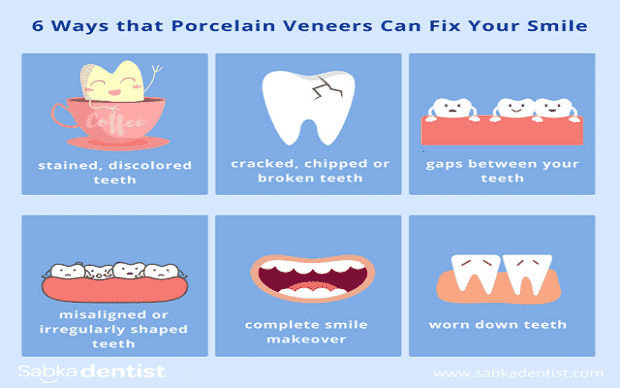Dental Veneers
Dental veneers are a potential solution to achieve the look you desire. They are a popular choice for those with a misshaped teeth or a gap between natural teeth. They can also help the discolored teeth which cannot be restored by cleaning or bleaching.

Talk to a Dentist Now!
Table of content
- What is dental veneer?
- Why would I need an oral veneer?
- How long does the whole process of getting veneers take?
- What are the advantages of porcelain veneers?
- What are the disadvantages of dental veneers?
- What type of dental problems does veneers fix?
- What to know before getting veneer?
- How do you take care of veneers?
What is dental veneer?
It is an ultra-thin, custom-made porcelain laminates that are bonded to the teeth. They may be fabricated from composite as well. They can close gaps, enhance the shape, or change the color of the teeth.
Why would I need an Oral veneer?
- Discoloration: When your teeth are stained or discolored and can’t be whitened by bleaching
- Chipped or worn outteeth: When a tooth has worn out, veneer is the best possible treatment to correct it.
- Uneven spaces or a large gap between the upper front teeth: In such cases placing a veneer will help to make the teeth appear aesthetically good.
- Anamolies: Anamolies like Enamel Hypoplasia, Fluorosis, Amelogenesis Imperfecta, etc.

How long does the whole process of getting veneers take?
Treatment planning: This initial step is to find out whether treatment is suitable for you. It requires your active participation. Explain to your dentist about the result you are expecting.
During the consultation, your dentist will look at your teeth to ensure veneers are suitable for you and discuss the procedures and its limitations. The dentist may use the X-ray to analyze the tooth condition.
For the veneer procedure, your dentist will remove as little amount as required to place the veneer. This is amount almost equivalent to the thickness of the veneer to be added to the tooth surface.
Next, your dentist will make an impression of your tooth. Then this impression will be sent to the laboratory where the veneer teeth will be custom made. It may take two weeks to place the final veneer. Generally, they will place temporary veneers first.
Before cementing a permanent veneer teeth the dentist will temporarily place it on your tooth to check its fit and color. The veneer will repeatedly be removed and trimmed as needed to achieve the proper fit.
The color of the veneer shade can be balanced with the shade of cement to be used. Next, the cement is applied to the veneer, which is then placed on the tooth.
You may require a few visits in two or three weeks to check how your gums are reacting to the veneers.

Below are the Pros & Cons of Dental Veneers
What are the advantages of porcelain veneers?
- They are strong and long-lasting: With proper care, a veneer teeth can last for many years. Your dentist will teach you about how to keep them well.
- They have a natural-looking surface: If you are thinking to achieve a natural-looking smile veneer is the best possible solution. Your dentist will help you to make the custom fit arrangement according to your expectation.
- Less tooth enamel needs to be removed than with a crown or cap:The dentist will trim the tooth surface to make the crown fit. In the case of veneer, the trimming amount would be less.
- They don’t stain easily: The veneers are made from porcelain material which is resistant to any kind of stains. However daily brushing is required to keep the mouth clean and infection free.
What are the disadvantages of dental veneers?
The drawback to veneer teeth include:
- The procedure isn’t reversible.
- Veneers are more exorbitant than composite tar holding.
- Veneers are generally not repairable should they chip or split.
- Since lacquer has been evacuated, your tooth may turn out to be progressively touchy to hot and cold nourishments and refreshments.
- Veneers may not actually coordinate the shade of your other teeth. Additionally, the facade’s shading can’t be modified once set up. On the off chance that you plan on brightening your teeth, you have to do as such before getting veneer.
- In spite of the fact that not likely, veneer teeth can remove and tumble off. To limit the opportunity of this happening, don’t chomp your nails; bite on pencils, ice, or other hard items; or in any case put exorbitant focus on your teeth.
- Teeth with facade can even now encounter rot, potentially requiring full inclusion of the tooth with a crown.
- veneers are not a decent decision for people with unfortunate teeth (for instance, those with rot or dynamic gum ailment), debilitated teeth (because of rot, break, enormous dental fillings), or for the individuals who have a lacking measure of existing finish on the tooth surface.
- People who grip and granulate their teeth are poor contenders for porcelain facade, as these exercises can make the facade split or chip.
What type of dental problems does veneers fix?

Veneers are bonded to fix:
- Teeth that are spoiled – either due to root canal treatment; antibiotics medication or different medications related to health, extreme fluoride or different causes; or the nearness of enormous sap fillings that have stained the tooth
- Teeth that are worn out
- Teeth that are chipped or broken
- Teeth that are skewed, lopsided, or sporadically molded (for instance, have holes or lumps in them)
- Teeth with holes between them (a tiny gap that is visible to the eye is fixed)
What to know before getting veneer?
- Your teeth and gums should be healthy before you get veneers. If you have gum disease, it should be treated before getting the veneer inserted.
- Veneers are not always a good choice for patients who clench or grind their teeth, because the thin veneers may crack due to grinding the teeth. If you clench or grind your teeth, your dentist may recommend wearing a plastic dental night guard at night.
- The dentist removes only the required amount of tooth enamel to insert the veneers. Although the process cannot be undone once the enamel is removed.
- Sometimes it is possible for veneers to come loose over time. In that case, new ones might be needed.
- It is suggested to discuss all your expectations and treatment options with your dentist. Regular dental visits are required for keeping teeth and gums healthy.
How do you take care of veneers?
- Veneers may break under pressure. So, your dentist may suggest avoiding biting hard foods.
- It may take you a few days to get adjusted to the feel of your veneers. In the starting days of wearing veneer, you may not feel comfortable. But discuss with your dentist if your bite does not feel right after the veneer has been placed. He or she will correct it before you leave the clinic.
- Keep your gums clean by brushing and flossing. There is a possibility that you can still get cavities under or around veneers. To ensure you are doing in a proper way.
Expert's Opinion
- Dr. Zita Antao Dental Director of Sabka dentist says “Veneers are thin shells of porcelain or composite resin that are custom made to fit over teeth, providing a natural, attractive look.They can be used to fix chipped, stained, misaligned, worn down or unevenly spaced teeth.”
- Dr. Ankita Gada Dental Director of Sabka dentist says “Porcelain Veneers are strong, long lasting and don’t stain easily unlike composite veneers that are not that strong and stain easily. However, composite veneers can be repaired easily and quickly, while porcelain veneers are permanent.”
- Dr. Reena Waghela Dental Director of Sabka dentist says “Before you get veneers, your teeth and gums must be healthy. It is not a good choice for patients who clench/grind their teeth.”
Frequently Asked Questions
Are Veneers permanent?
What happens to teeth under Veneers?
Teeth need to be reduced and prepared first to accommodate Veneers.
How are Veneers applied?
- Composite Veneer:
It is directly placed (built-up in the mouth) by dentist in clinical setting and polymerized using hand held curing light after application of etchant and bonding agent.
Or
It is indirectly fabricated by dental technician in a dental lab after recording an impression and later bonded to the tooth/teeth using resin cement.
- Porcelain Veneer: It may only be indirectly fabricated and later bonded to tooth/teeth surface.
Do you have to shave down your teeth for Veneers?
Approximately 0.5 – 0.8 mm of tooth enamel is removed to achieve better bond strength and retention for veneers. This may vary according to the number of teeth, type of veneer and tooth anatomy.
A full veneer crown covers all the coronal tooth surfaces i.e. mesial, labial, distal. lingual and occlusal. About 1 – 1.5 mm is removed from all the tooth surfaces in this case.
Porcelain Laminate Veneer comprises of ultra-thin laminate layer that covers only the surface of the tooth. Incisal edge preparation requires reduction by 0.5 – 1 mm.
Are Lumineers better than Porcelain Veneers?
Traditionally, Veneers are made of porcelain and require tooth reduction. Also, they are long lasting.
On the other hand, Lumineers are non-invasive and require minimal tooth preparation. They are semi-permanent. After application, they can be removed with minimal damage to the teeth.
How often do you have to replace veneers?
Average lifespan of Veneer is about 10 years. When veneers eventually wear out, they will need to be replaced in the same way as the initial installation.
Where can the veneer treatment be considered?
Here are the situations where the veneer treatment for teeth can be considered:
- Worn teeth or teeth chipping
- Tooth discoloration
- Gap between teeth
- Certain kinds of teeth anomalies
How long do veneers last?
Veneers are long-lasting which can last for more than 9 years. They can be strong where there can be whiter shine on teeth that will prevail for a longer duration.
What care to take after the veneer treatment?
- Few days after the veneer treatment, it can be uncomfortable.
- Biting of the hard food must be avoided where the veneer is applied, as it can break under the pressure.
- A proper brushing and flossing activity must be done regularly.
- A regular dental check-up after every six months interval.
As veneers prices are a little high comparatively, people tend to avoid them. If you are looking for the low teeth veneers cost in India then Sabka dentist is a better choice. They can give excellent quality veneer treatment that can improve the quality of your smile. Come to Sabka dentist to get quality veneer treatment to get aesthetic teeth appearance.
About Author

Dr.Ankita Gada is a dental director alliances with SabkaDentist. She is a highly skilled dental Surgeon and Implantologist with an experience of more than 10 years. She Pursued her BDS degree from Nair Hospital Dental College, Mumbai, and completed her PGDBA, Marketing from Symbiosis University, Pune.
She is a highly- skilled dentist in implants and planning full mouth rehabilitation cases. She is well versed with all the advanced technology and materials of dentistry that allows her to keep up with the constant changes in the field of modern dentistry.








